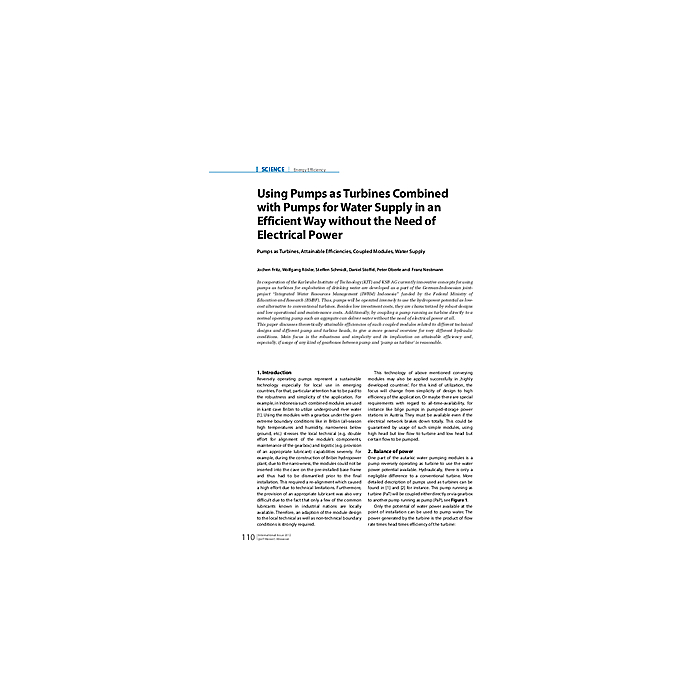Using Pumps as Turbines Combined with Pumps for Water Supply in an Efficient Way without the Need of Electrical Power
4,90 €
Auf Lager
Artikelnummer
05399_2012_SP1_15
In cooperation of the Karlsruhe Institute of Technology (KIT) and KSB AG currently innovative concepts for using pumps as turbines for exploitation of drinking water are developed as a part of the German-Indonesian joint-project "Integrated Water Resources Management (IWRM) Indonesia" funded by the Federal Ministry of Education and Research (BMBF). Thus, pumps will be operated inversely to use the hydropower potential as low-cost alternative to conventional turbines. Besides low investment costs, they are characterized by robust designs and low operational and maintenance costs. Additionally, by coupling a pump running as turbine directly to a normal operating pump such an aggregate can deliver water without the need of electrical power at all. This paper discusses theoretically attainable efficiencies of such coupled modules related to different technical designs and different pump and turbine heads, to give a more general overview for very different hydraulic conditions. Main focus is the robustness and simplicity and its implication on attainable efficiency and, especially, if usage of any kind of gearboxes between pump and 'pump as turbine' is reasonable.
| Autoren | Jochen Fritz/Wolfgang Rösler, Steffen Schmidt, Daniel Stoffel, Peter Oberle and Franz Nestmann |
|---|---|
| Erscheinungsdatum | 30.06.2012 |
| Format | |
| Zeitschrift | gwf - Wasser|Abwasser - Special 1 2012 |
| Verlag | DIV Deutscher Industrieverlag GmbH |
| Sprache | English |
| Seitenzahl | 4 |
| Titel | Using Pumps as Turbines Combined with Pumps for Water Supply in an Efficient Way without the Need of Electrical Power |
| Beschreibung | In cooperation of the Karlsruhe Institute of Technology (KIT) and KSB AG currently innovative concepts for using pumps as turbines for exploitation of drinking water are developed as a part of the German-Indonesian joint-project "Integrated Water Resources Management (IWRM) Indonesia" funded by the Federal Ministry of Education and Research (BMBF). Thus, pumps will be operated inversely to use the hydropower potential as low-cost alternative to conventional turbines. Besides low investment costs, they are characterized by robust designs and low operational and maintenance costs. Additionally, by coupling a pump running as turbine directly to a normal operating pump such an aggregate can deliver water without the need of electrical power at all. This paper discusses theoretically attainable efficiencies of such coupled modules related to different technical designs and different pump and turbine heads, to give a more general overview for very different hydraulic conditions. Main focus is the robustness and simplicity and its implication on attainable efficiency and, especially, if usage of any kind of gearboxes between pump and 'pump as turbine' is reasonable. |
Eigene Bewertung schreiben


